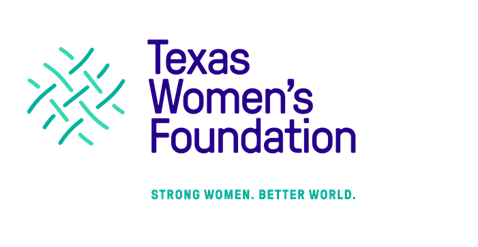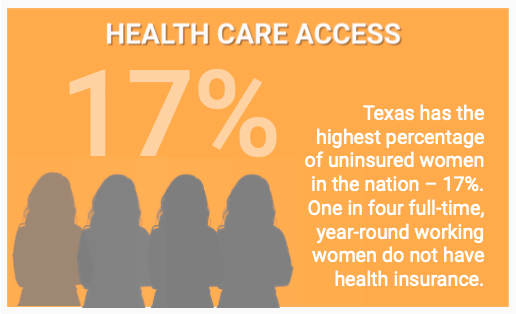Our Latest Research
Women & The Wage Gap
As a follow-on to The 2024 Economic Issues for Women in Texas Report, Texas Women’s Foundation has released a white paper outlining the annual economic impact of the wage gap in Texas. This paper serves as a “Corporate Leader’s Guide to Driving Workforce Sustainability” – offering data, insights, and strategies designed to increase employee satisfaction, productivity, and retention and ensuring the continued strength of Texas’ $2.4 trillion economy, which is increasingly dependent on women.
Share and Engage
Utilize these visual assets and talking points to raise awareness and advocate for women and the wage gap.
Read the White Paper
As a follow-on to The 2024 Economic Issues for Women in Texas Report, Texas Women’s Foundation has released a white paper outlining the annual economic impact of the wage gap in Texas. This paper serves as a “Corporate Leader’s Guide to Driving Workforce Sustainability” – offering data, insights, and strategies designed to increase employee satisfaction, productivity, and retention and ensuring the continued strength of Texas’ $2.4 trillion economy, which is increasingly dependent on women.
Learn to Work Smart™ with TXWF & AAUW
Check back for upcoming Work Smart Salary Negotiation Webinars coming soon!
The 2024 Report
Texas Women’s Foundation’s 2024 Economic Issues for Women in Texas Report examines the pivotal role women play in driving growth and innovation in the state’s estimated $2.4 trillion economy. It also illuminates the critical need to invest in the barriers that prevent Texas women and families from achieving economic security, stability, and success.
This fifth edition of the report, first published in 2014 and produced every two years in partnership with Every Texan, includes rich data about the state of women in Texas and provides policy recommendations designed to improve the lives of women and families across the state. These data and recommendations are shared freely with local and state lawmakers, policymakers, corporate and community leaders, and TXWF supporters, partners, and advocates. It will take all of us – working together – to drive the meaningful, systemic change needed for all Texas women and families to thrive.
The 2024 Economic Issues for Women in Texas Report
We encourage our Army of Advocates across Texas to use and share the study – and its platform of specific recommendations and potential actions – with lawmakers, as well as business and community leaders, to help shape policies and practices that impact women and girls.
Key Findings
Women & the Workforce
More than 1.1M women have joined the Texas workforce since 2014 – a 31% increase.
Workforce Findings:
- Women comprise 46% of theTexas workforce.
- The population of women is expected to continue to grow. By 2040, Texas will be home to 18.5 million women.
- Women-owned businesses in Texas employ 1 million people and generate $42 billion in wages annually.
Women & the Wage Gap
Women earn 83% of what their male counterparts earn, and Black and Hispanic women fare even worse.
Wage Gap Findings:
- The wage gap is costing Texas over $47 billion annually in lost earnings and productivity.
- Women with the highest level of educational attainment face the greatest pay gap, with a $35,000 difference in median earnings between men and women with graduate degrees.
- Closing this gap would drive $21.5 billion in economic impact.
Affordable Child Care
Access to affordable child care is an $11.4 billion crisis for Texas, Texas women and families
Child Care Findings:
- The average cost for full-time infant care in Texas is $9,360 annually, consuming nearly a quarter of a single mother’s income and more than half for minimum-wage earners.
- Only 44% of 3- and 4-year-olds are enrolled in pre-K, limiting women’s ability to remain in the workforce. Expanding universal pre-K could contribute over $5 billion annually to Texas’ economy.
- Child care deserts, especially for those working non-traditional hours, hinder women’s workforce participation. The $11.4 billion annual economic loss due to this issue highlights its severity.
Health Care Access
Access to health care is inextricably linked to health insurance. At 17%, Texas has the highest rate of uninsured women in the nation.
Health Care Access Findings:
- One in four, full-time working women in Texas does not have health insurance.
- Women below the federal poverty line (FPL) face significantly higher uninsured rates, with 41% of women below 100% FPL uninsured, compared to just 9% of those above 200% FPL.
- Younger women (aged 18-24) experience the highest uninsured rates, with 24% lacking coverage.
Stable Housing
Housing is an anchor of economic security for Texas women and families. For most families, housing represents their largest monthly expense.
Stable Housing Findings:
- One in three Texas households is cost-burdened, spending more than 30% of their income on housing.Single mothers and women of color are disproportionately impacted.
- Black families in Texas have a homeownership rate of only 41%, and Hispanic families have a rate of 59%, compared to 71% for white families.
- Texas faces a shortage of approximately 500,000 affordable housing units, leaving low-income women and single mothers waiting years for housing assistance or being forced to spend a disproportionate share of their income on rent, deepening financial instability.
Education & Training
Texas women lead the state in college enrollment and degree attainment, earning 58% of all degrees awarded in the state.
Education Findings:
- Despite earning 1.4 times the number of college degrees as their male counterparts, women with a bachelor’s degree still earn considerably less than men with a median earnings gap of over $20,000.
- Black and Hispanic women have lower rates of attaining bachelor’s degrees or higher (30% and 19%), compared to 41% for white women and 58% for Asian women.
- While the number of women in leadership positions has increased, men still occupy 72% of the top executive positions in Texas.
Policy Recommendations & Legislative Priorities
Texas has experienced significant economic growth in the last decade, with women playing an increasingly pivotal role. The success of Texas’ future economic growth is inextricably tied to the economic security and empowerment of its women and families. However, systemic barriers — such as wage inequality, lack of affordable child care, inadequate health care access, and housing instability — continue to impede women’s full participation in the workforce and negatively impact Texas families.
By addressing these core challenges, Texas can unlock the full potential of its workforce and ensure prosperity for all. Effective policy, along with continued public-private partnerships, will enable Texas women and families to thrive.
Use your voice to join the movement for Texas women and girls!
Check out the digital toolkit for content and graphics to share with your networks and digital audiences. Together we can move women and families across Texas from surviving to thriving!
About Every Texan
Since its founding in 1985, Every Texan (formerly the Center for Public Policy Priorities) has expanded opportunity and equity for Texans of all backgrounds. Every Texan is a nonprofit organization that researches, analyzes, and advocates for public policies to expand equitable access to quality health care, food security, education, and good jobs. Learn more about how Every Texan is making Texas the best state to live in at everytexan.org.







